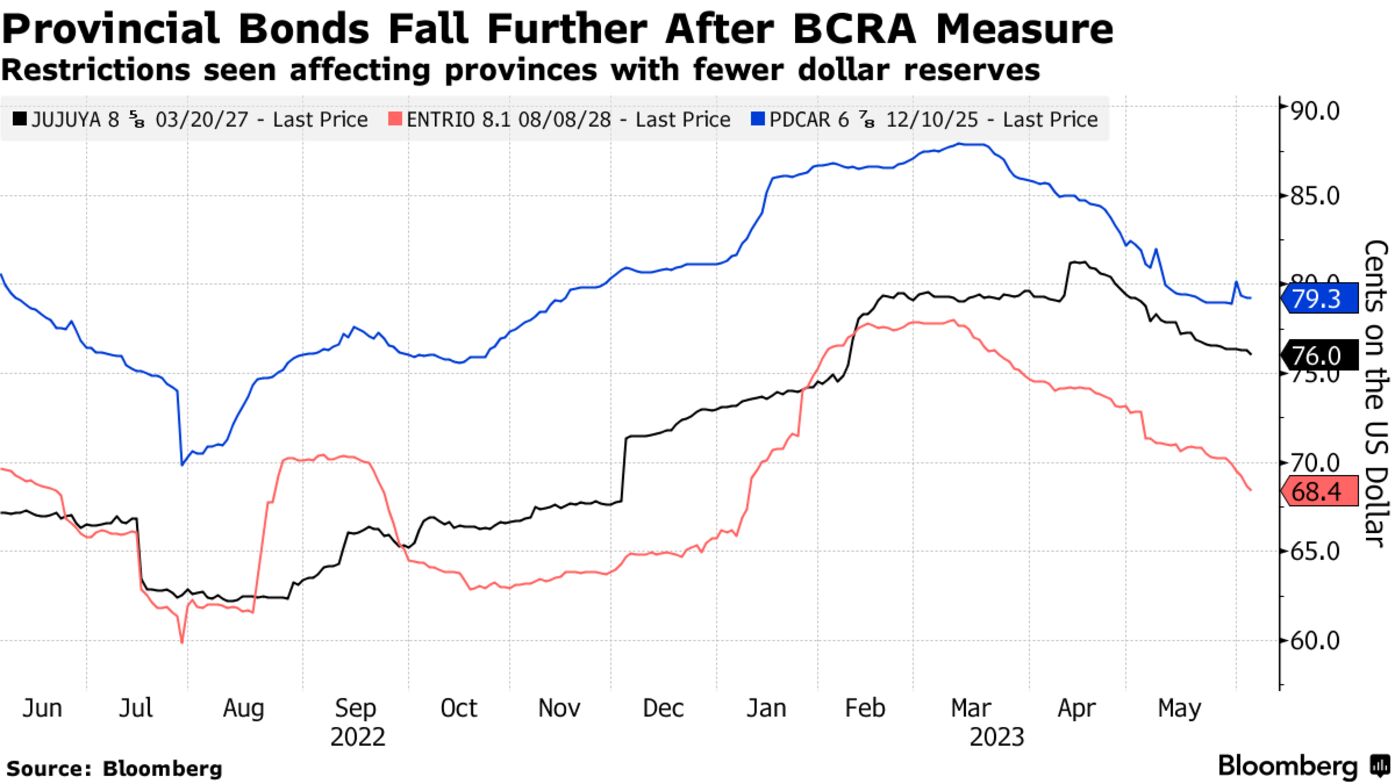Argentine Province to Meet Debt Payment After a Court Blocked Government’s Latest Capital Controls
- Central bank had restricted provinces’ access to FX market
- Province of Cordoba to make $120 million payment due June 10
The Argentine province of Cordoba will meet a debt payment due June 10 after a court ordered the central bank to sell dollars to the local government, suspending capital controls imposed by the government late last week.
Cordoba will make a $120 million principal payment to bondholders following the court ruling late on Tuesday. But the central bank said it would appeal the decision, threatening future payments by other regions.
The government had announced June 1 that provinces wouldn’t be allowed to access more than 40% of the dollars they need to pay maturing debt on the official market as the central bank tries to cling on to its vanishing reserves. It’s a sign of how bad the currency crisis has become that the government is willing to pit the central bank against the provinces, the most vulnerable of which are often run by its own political allies, such as Entre Rios.
“If extended, the measure will considerably limit regional and local government’s financing options and force provinces with weak foreign-currency positions and significant debt obligations to resort to debt restructuring processes towards 2024,” Moody’s Investor Services analysts including Cristiane Spercel wrote in a note.
Bonds from Entre Rios and the northwestern province of Jujuy extended recent declines following the central bank’s announcement, hitting a five-month low this week. Cordoba’s debt has also hovered near its lowest since November, at around 79 cents on the dollar.
Cash Reserves
In total, the provinces had $1.2 billion of available foreign-currency deposits as of 31 March making any payments through June relatively safe, Moody’s said.
However, their debt-service costs increase to about $665 million in the second half of the year, then to $1.6 billion in 2024 and to $2.1 billion in 2025. Few are likely to have the savings needed to meet that level of payments.
There is a reason the government is willing to take the risk of pushing some provinces into restructuring their debts for the second time since 2020.
The central bank’s foreign currency reserves have dropped to the lowest in more than six years, slumping by $6 billion since the end of March alone. As reserves evaporate, concerns are mounting over how much longer the authorities can defend the peso from an all-out collapse, fanning inflation already running at 109%. The peso on the parallel, or blue-chip market is trading at half of its value at the official exchange rate.
Read More: Argentina Is Going Broke to Stall a Full-On Currency Collapse
The central bank is “desperately trying to keep the lights on,” TPCG strategist Federico Martin wrote in a note June 2. “We expect the government to continue tightening the screws on the capital controls framework. Today, it’s the provinces. Tomorrow, who knows?”
Worst Off
Among the provinces with the most significant amount of debt falling due in the second half of 2023, the Province of Cordoba has principal debt payments of $256 million, the Province of Mendoza has $45 million and the Province of Chubut has $39 million, according to Moody’s.
As of March 2023, Cordoba had foreign-currency deposits amounting to $162 million, Mendoza had $168 million and Chubut had $39 million.
The new capital controls are “another inadequate response to excess demand for dollars at the official exchange rate, but at the margin it’s good news for the sovereign’s ability to pay,” said Graham Stock, a strategist at Bluebay Asset Management in London. “I expect all provinces to stay current, though it may be a bit of a stretch for some, as they will need to use a bigger share of their pesos if they have to buy dollars through the parallel exchange market.”

Keine Kommentare:
Kommentar veröffentlichen